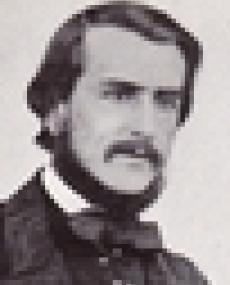
Missionary; Assistant Commissioner in Bechuanaland (now Botswana); imperial agent used by Cecil John Rhodes to negotiate what became known as the Moffat Treaty.
John Smith Moffat was born on 10 March 1835 in Kuruman, South Africa. He was the son of the missionary Robert Moffat, who was friends with Mzilikazi, the father of Lobengula. He was also brother-in-law to the missionary and explorer David Livingstone. Moffat was educated at Cheshunt College and then New College in London. He joined the London Missionary Society in 1858 and also married Emily Unwin the same year. His father settled him at Inyati in 1859, where he lived for six years.
He helped start the first mission in Matabeleland in 1859. In 1865 he took over the running of his father’s mission in Kuruman, South Africa.
In 1879 John Moffat resigned from the missionary society and joined the British colonial service. In 1884 he became the Assistant Commissioner to Sir Sidney Shippard in Bechuanaland (Botswana). From 1887 to 1892 he was a representative of the Chartered Company in Matabeleland.
Since he was known in Matabeleland and also banking on his father’s reputation there, Cecil John Rhodes sent him to negotiate a treaty with Lobengula. The treaty stipulated that Lobengula was not supposed to give any further concessions or enter into any other treaty without approval from the Queen’s representative in South Africa. Moffat was trusted by Lobengula and his verbal promise that Lobengula would get British protection – like Khama, the ruler of Bechuanaland – led to the signing of what became known as the Moffat Treaty on 11 February 1888. John Smith Moffat’s intervention established Rhodes’s first step in his colonial adventure.
Later on, Moffat discovered the extent of Rhodes’ deception of Lobengula and the deceit behind numerous concessions negotiated by Rhodes’ British South African Company (BSAC). After the Pioneer Column provoked Lobengula into the First Matabele War, Moffat fell out with Rhodes. In 1893 he exposed the fraud behind the BSAC Bosman Concession in Ngamiland (now the North-West District of Botswana), leading to its abandonment. In 1894, when the BSAC police clashed with warriors of the Bamangwato under King Khama III, Moffat warned that Khama was Rhodes’ next victim, but this was dismissed by his boss, Shippard who was Rhodes’s agent.
In 1895, Bechuanaland was moved to the Cape Government and Moffat retired. He died on 25 December 1918 in Mowbray, Cape Town, South Africa.